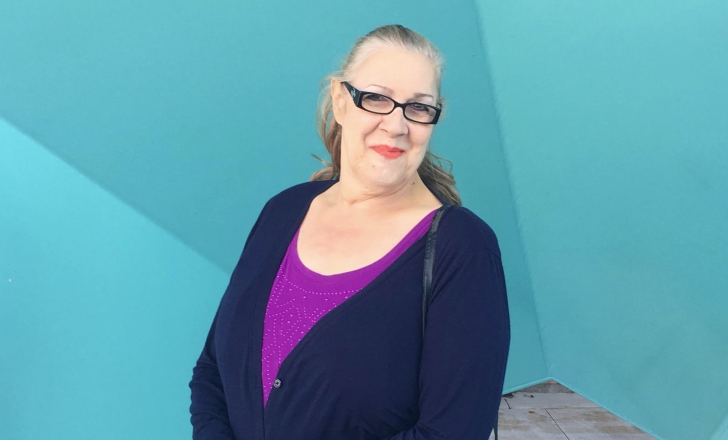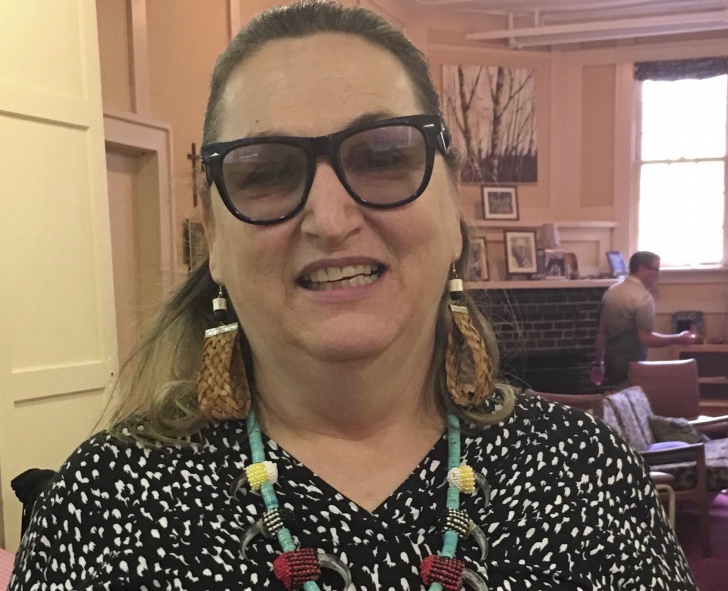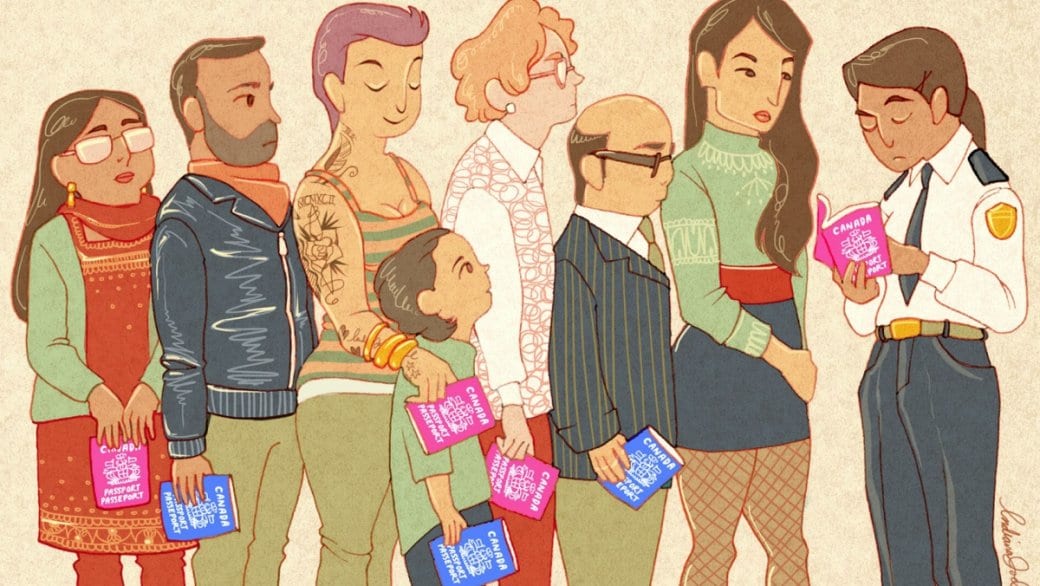As a human rights complaint to remove gender markers from BC birth certificates makes its way slowly towards a 2017 hearing, a debate is raging between trans activists who are calling for gender-free ID, and others who say the markers should stay.
The Trans Alliance Society is one of eight complainants pushing BC’s Vital Statistics Agency to allow gender-free birth certificates. Debate over the removal of gender markers has blossomed on the society’s Facebook page.
Morgane Oger, chair of the Trans Alliance Society, says there is no inherent need to include gender on documents used for administration. She would like to see the markers removed.
Oger says the insistence that gender be noted on primary documents, particularly birth certificates, not only lacks utility but can cause harm, especially for people who are non-binary or gender-variant, or who have an appearance not interpreted by others as conforming to a binary expression of male or female.
Non-binary people are forced to have gender markers that don’t match their identity, she says.
“All of these people are harmed in different ways, but fundamentally the presumption that there’s a piece of paper that has a marker on it that proves your gender is used against all of those people.”

Assigning a gender at birth and stamping it on a piece of paper — rather than allowing an individual to assert their own gender identity — stigmatizes and suffocates trans people, and makes them more vulnerable to mistreatment, discrimination and unwarranted scrutiny, Oger says.
Gender markers “don’t represent everybody,” she tells Daily Xtra.
“They’re known to be wrong some of the time, [yet] they’re considered a certificate of absolute truth.”
She also notes that it costs money to get inaccurate gender markers changed on ID — money that some trans people don’t have. If someone identifies as a man, for example, but can’t afford to change the gender marker on their documents — “so this drags on, because of their poverty?” she asks.
Though Oger acknowledges that some members of the trans community want gender markers to stay, she says all but a few of the approximately 110 individuals from the community who attended a 2014 meeting voted to move forward with the human rights complaint.
Still, she recognizes that some trans activists have fought hard over the years to change gender markers on documents to accurately reflect their gender.
“It really was a struggle to get that acknowledged, so now they hold that to their heart,” she says.
“Then there are other people who fought very hard, and resented even having to show that information,” she adds. “And I was one of those people.”

Jamie Lee Hamilton, a trans sex worker activist since the 1970s, is a vocal opponent of removing gender markers.
“I’m not like really beholden to gender markers,” she says, “but I understand the need for them because so many of my friends — really, it’s a validation of everything you might have gone through.”
Hamilton maintains that the historical context — the long fight to have the markers altered to accurately reflect some trans people’s gender — needs to be taken into consideration here.
People shouldn’t be forced to fit themselves into the gender binary, Hamilton acknowledges, but we don’t live in a genderless society, she says.
“I think there’s many people who are gender-fluid, it might be not fixed into a binary,” she says. “But we can’t just forget about all the people who have gone through gender reassignment surgery throughout the world — and many have gone on to lead stealth lives.”
“I think it’s a really difficult issue and I think there are people that are taking some hard-line stances,” she says. “I think the younger people have the theory, and the theory is pretty bang-on, but you can’t have it at the expense of real, lived experience.”
Oger agrees that generational differences can be a factor informing views on gender markers. Generally people under age 30 tend to see less value in gender markers, she says. But that’s not the only factor.
The longer a person has lived post-transition, the more likely they are to identify strongly with their binary gender identity, she suggests.
“Trans women, we’re very attached to our gender identity documents,” she says. “Why is that? Because we’re always policed over it.”
But gender markers on ID “do not help in any way to prove an identity,” she maintains.
She’s been discriminated against many times, she says, as people have acted on their perception of her gender identity. “Not once did anybody who discriminated against me ask me to show them a birth certificate.”

Sandra Laframboise, who is two-spirit and has been an activist since 1971, agrees that the younger generation leans toward a more gender-diverse, gender-neutral community, but doesn’t think it’s wholly a generational divide.
“I think there’s the old-school thought that people are clinging on because we’ve got our scars and battles for it,” she says.
But, she says, “I think some of us are flexible and are open to the idea.”
The youth “have a different agenda, and good for them,” she says, “because those of us in my age group — we fought for that.”
She says she would prefer to see multiple options available on identification, though she rejects the option of an X, which she feels is an erasure. (So do Hamilton and Oger. Hamilton considers an X a mark of otherness — “and I wouldn’t want that for myself because I think it literally puts an X on your head.” Oger agrees and has rejected a government suggestion to include an X as a third gender marker. “If you have some sort of a thing somewhere that says that you are an other — someone, somewhere will try to use it against you,” she says.)
Ultimately, Laframboise says she will support whatever the trans community decides.
“Like any community we have different segments. Now that we are a viable community, we’re now evolving and finding different areas we need to improve and enhance,” she says.
“I’m not sure all trans people are for the gender-marker removal, so we need to be careful in pushing forward agendas and community issues if not all of us are on board.”

For Catherine Jenkins, the use of gender markers is a nuanced issue.
“It’s such a divisive issue because gender markers have a different meaning for different people, for different trans people,” says Jenkins, who is treasurer of PFLAG Vancouver.
Jenkins identifies as a binary trans woman and says it can be wonderful to have an F on her ID, but she also believes removing the markers would be beneficial too.
“I think it’s a very sensitive situation,” she says, “but I think while arguments are made that it only helps non-binary trans folk, I think in a lot of ways it really frees us all from this reductionist, binary point of view.”
She recognizes the worry that an optional marker removal or an X marker may result in trans people being targeted, but points out that if no one had markers it would be a non-issue.
“At the very minimum it’s important for our society to move forward and for trans people to gain the ability to self-identity.”

RJ Vandrish sits on a new advocacy organization aimed at ending what it calls “state-assigned gender.”
The Gender Free ID Coalition launched in July 2016. Initially, it included members who met through lesbian lawyer barbara findlay, whose cases include the human rights complaint awaiting hearing in BC.
“I don’t think we should have a system where people have to prove who they are in terms of something that is quite personal,” Vandrish says. “In a lot of cases it’s not even relevant.”
Vandrish, who uses the pronoun they, is a complainant on a federal human rights complaint against Passport Canada to remove gender markers there.
“It doesn’t matter what your gender is if you drive, if you leave the country — gender isn’t required for those activities,” Vandrish says.
“I think if we removed gender we could start moving past a culture where it’s acceptable to question people’s gender and expect them to have to prove it to others.”
A binary system discriminates against people who are non-binary, they say, and having X as a third option would out non-binary people.
Still, they recognize that trans women are particularly vulnerable to violence and scrutiny.
“I fully empathize with feeling the need to use ID as a shield when I voice my opposition to having gendered IDs,” they say.
At the same time, Vandrish adds, “when we tell the government not to record our genders, we’re also saying to society that demanding others to prove their gender is not acceptable.”

 Why you can trust Xtra
Why you can trust Xtra


